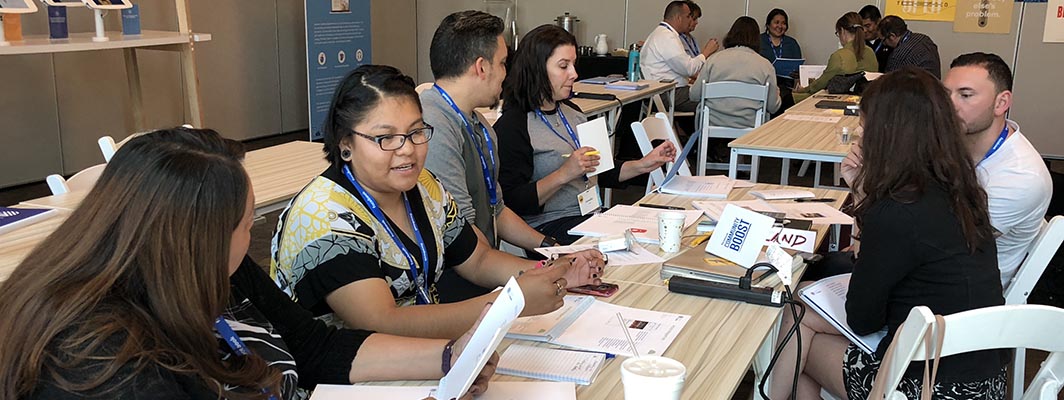
December 13, 2018 | By Sierra Noakes
To see the power of a shared vision and cross-agency and cross-sector collaboration, look to the state of Rhode Island. In September 2016, Rhode Island Governor Gina Raimondo announced an ambitious goal to successfully support 70 percent of working-aged individuals in the state in earning at least an associate degree by 2025. The Governor’s vision is based on evidence that in the near future, 70 percent of jobs created in the state will require more than a high school diploma. The state government is committed to achieving this vision through strategic investments and statewide collaboration.
In September 2018, Digital Promise conducted interviews with 10 individuals working for or with the state to illuminate best practices and strategies devised to achieve this goal. Through the utilization of an expansive data sharing platform, Rhode Island hopes to conduct robust analyses to:
Initially developed using federal dollars, the state continues to fund and optimize its longitudinal data system, the Rhode Island DataHUB. Housed at the University of Rhode Island, the DataHUB is maintained by DataSpark, a team of researchers who support state agencies in managing their data, designing research projects and data stories, and visualizing the data to inform the public and “inspire innovative decision making.”
Rhode Island’s DataHUB houses identifiable data from K-12, higher education, and workforce development, along with other state agencies. The system uses an algorithm that pulls identifying data from multiple sources, such as the DMV and public institutions of higher education, which allows for multivariate analyses across factors such as race/ethnicity, gender, and age. The state is currently working to expand the data sharing platform to include inter-state wage data for Rhode Island residents and degree and credential data from private institutions and third-party education providers. The increased types of matched data will allow the DataSpark team to conduct robust analyses to evaluate quality of services, improve workforce development programs, and support providers and employers in developing pathways for individual Rhode Island residents.
Ultimately, these data and analyses will inform program and investment decisions. The Governor’s Workforce Board (GWB) and other state agencies, in partnership with Johns Hopkins University, are already using de-identified data to develop innovative performance indicators for the state’s workforce development partnership programs (Real Jobs RI and Real Pathways RI). In order to determine whether these programs are meeting the needs of Rhode Island employers and assisting populations with severe barriers to employment, collaborators are building customized return on investment analyses that consider program impacts on both short-term employment and on longer-term earnings and quality of life factors. The collaboration will then interpret these results with the state’s job needs in mind, such as Rhode Island’s projected job demands or key job competencies that employers share, which will help policymakers in evaluating the quality, relevance, and need for various programs as part of larger investment decisions.
Rhode Island state agencies are also committed to sharing aggregate data and reports with the public to hold policymakers accountable to the taxpayers. Currently, the state is working to develop the PK-20 Workforce Dashboard, which will enable the public to see aggregate-level data about how many individuals are successful in various education and workforce development programs. Because the dashboard is built on matching individual-level data in the backend, users can interact with the data and view data disaggregated by factors relevant to them, such as race/ ethnicity, gender, age, and socio-economic status.
State-level policymakers stress that having the ability to disaggregate data is essential for identifying disparities among different populations and designing interventions to eliminate those equity gaps. Ultimately, the goal of the PK-20 Workforce Dashboard is to develop a more holistic picture of how Rhode Islanders progress from preschool through postsecondary education and into the workforce, within the state and throughout the New England region. By connecting data across silos, the DataHUB will allow researchers and program evaluators to measure the effectiveness of programs in new ways. One promising pattern shows how investments in CTE programs at the high school level are resulting in higher wages for graduates.
Interlaced throughout Rhode Island’s data-centric policies and practices is an emphasis on collaboration with industry. The state understands that in order to successfully meet the needs of the workforce, employers should have a seat at the table to share their needs.
One instance of this type of cross-sector collaboration is the newly formed Division of Workforce Partnerships at the Community College of Rhode Island (CCRI). CCRI established Workforce Partnerships in July 2018 to align the offerings of the college with the state’s economic and workforce priorities. Informed by employers and labor market data, staff focus on program development based on broad-reaching competencies individuals need to succeed in frontline and mid-level positions across the state’s key industries.
In one of these collaborative projects, the Partnerships team learned over discussions with a number of employers across industries that current customer service roles now require more data analysis skills compared to those of the past. The team engaged industry experts and college faculty to design a data literacy course that was then vetted across interested employer partners and piloted with AAA Northeast. Initial employer feedback has been excellent and the Division of Workforce Partnerships is working with the Rhode Island Department of Labor and Training to design a plan to scale this offering to other employers throughout the state.
Through these efforts, the state is determining the best programs and industries to invest in, and programs are able to use feedback and data to continuously improve and better meet the needs of those they serve and the state’s changing economic demands.
Rhode Island demonstrates that states can heavily impact workforce development through aligned, coordinated, and data-driven workforce development policies that catalyze program development and continuous improvement.
Learn more about strategies to support frontline workers through Digital Promise’s Adult Learning initiative.
By Jeremy Roschelle, John Whitmer and Peter Bull
By Adrianna S. and Kyrie F.